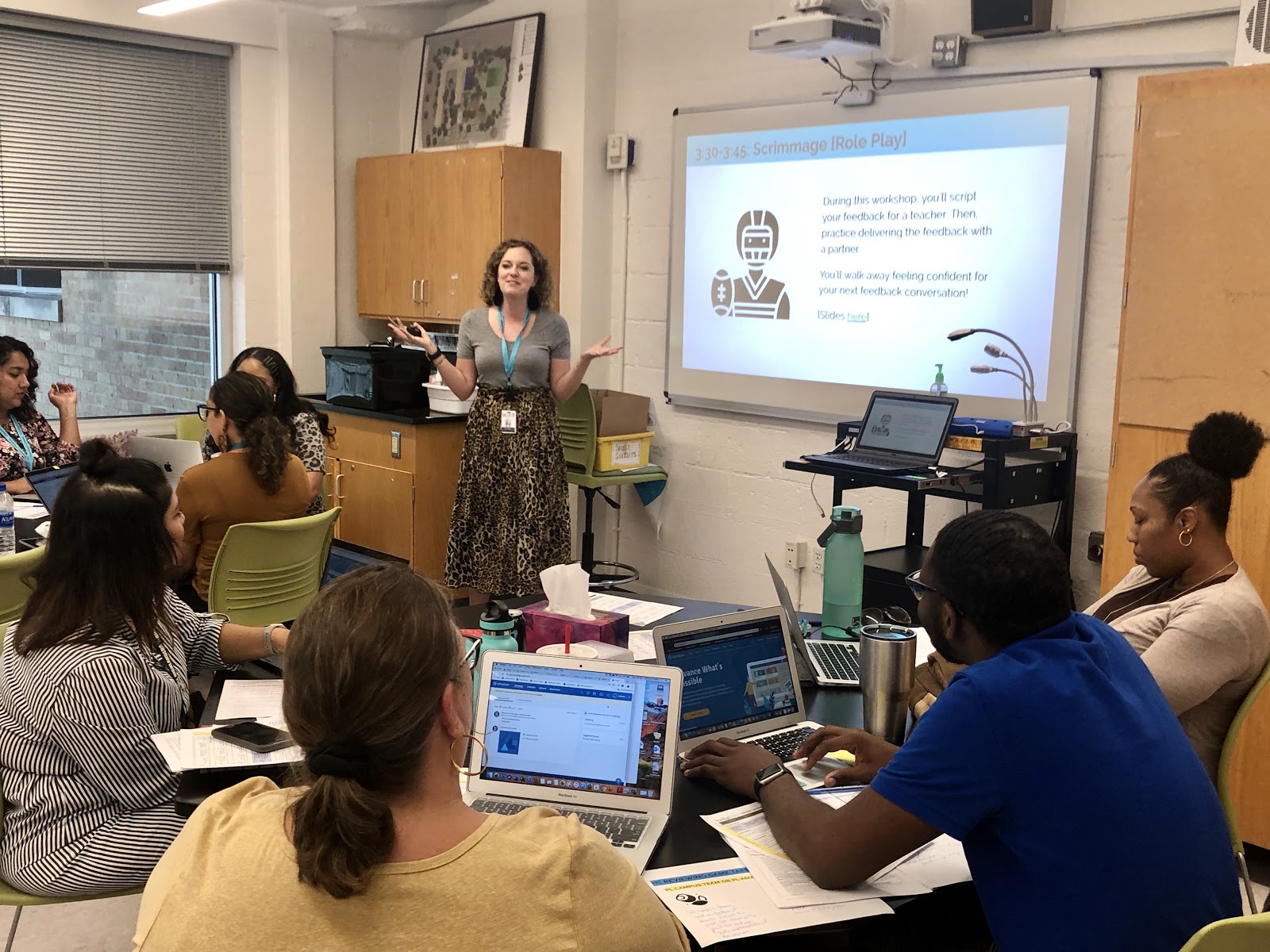At Dallas ISD, we approach personalized learning as a one-size-fits-one approach to instruction that taps into each student’s strengths, needs, and interests to customize learning. In five years, we’ve grown from five to 20 “wall-to-wall’ schools working to leverage personalized learning to meet student needs. Instructional coaching has become a critical part of our district’s shift and has helped us meet our teachers where they are and get out on the field to learn alongside them. This year we relaunched our coaching model with a football-inspired theme to support innovation becoming an integral role in school culture and encourage even more joy.
Why Quarterbacks?
Football is nearly a religion in Texas and those Friday night lights have most of us wearing our team jerseys and talking about our favorite players. As we looked for a fun way to redefine our philosophy around coaching, we realized that some of the key characteristics of football quarterbacks mirror the ones we need in our personalized learning coaches:
- Leader of an offense.
- Teams rely on a quarterback to execute plays as efficiently as possible.
- Ability to line the team up and evaluate the defense quickly, making any adjustments necessary to try and maximize the offense’s success. This can mean changing a play at the line of scrimmage, which is called an “audible.”
What is a Dallas ISD Personalized Learning Quarterback?
Just like on the football field, our Quarterbacks are the leaders of personalized learning on campus. Campus principals and teachers rely on a QB to execute “plays” to ensure personalized learning is implemented with fidelity. Part of their skillset is the ability to seed personalized learning in all campus systems and establish protocols to ensure sustainability. They must also have the ability to, as Anthony Kim writes in his book The New School Rules, “plan for change, not perfection.”
At Dallas ISD, we leverage our Personalized Learning Readiness Continuum to define system-level structures that distinguish a personalized learning school. This non-evaluative tool helps drive coaching for QBs at the district level and supports the belief that if we can identify where schools and individuals are at on their journey to personalization, then we can better align and differentiate supports to ensure success. Coaching and support for teachers as well as leaders are threaded across multiple domains on the readiness continuum because we believe it is one of the most important levers for change.

Quarterbacks Can’t Win the Game Alone
Just like football, personalized learning is a team sport. Hosting monthly personalized learning QB Huddles has helped us to establish and sustain a community of practice for leaders that’s fueled by collaborative growth. Each month is focused on different indicators from our personalized learning readiness continuum where we often ask one QB to highlight a strategy and then spend time sharing or refining plays to add to our playbooks.
A few coaching plays from our playbook:
Learner Profiles
A learner profile tells an individual’s academic and personal story over time and helps to establish a coaching relationship. It includes strengths, areas for growth, interests, aspirations, goals, and how the individual learns best. In Dallas ISD, Learner Profiles are leveraged for students, families, teachers, and leaders both at the central and campus level.
When leveraged between a teacher and their coach, a learner profile helps maximize the 1:1 meeting that often follows an observation. Instead of waiting for time face-to-face, teachers use their learner profile to reflect on practice and share evidence to support progress towards a goal before meeting with their coach. When face-to-face, there’s more time to dive into problem-solving current roadblocks, practicing or modeling a new strategy, or even co-creating an upcoming lesson instead of spending a majority of time reflecting on what’s not working. To learn more about how we leverage a learner profile throughout the coaching cycle, check out this case study.
Rethinking Feedback
When teachers begin taking risks and iterating around new innovative learning models in the classroom, they deserve feedback that supports continuous improvement. In many instances, instructional coaches are finding that they are now supporting teachers to do something that they’ve never done before. When you begin to lead with vulnerability, Brene Brown suggests that it is the birthplace of innovation, creativity, and change.
Instead of packaging feedback as praise, wondering, and polish we’ve begun to deliver feedback as “I like,” “I wonder,” and Inspiration. We’ve found that this helps encourage iteration vs. feeling like there is only one way to solve a problem.

Interested in learning more about our approach? Check out The PL Toolbox at www.thepltoolbox.com for access to Dallas ISD’s Personalized Learning Coaching and Development Rubric that includes classroom observation look-fors and coaching tools aligned to each part of the tool.
TAGS:



 Tweet
Tweet 



